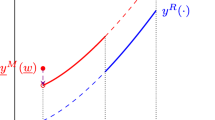Abstract
Citizens with heterogeneous tastes delegate to policy makers the authority to choose public policies. They may try to influence legislators in various ways. In this paper we assume that monetary lobbying and direct threats are the only instruments private individuals can use to influence the legislator. We model the relationship between the citizens and a single policy maker as a common agency game. Lobbies offer a policy and a payment according to a truthful contribution schedule, and the government takes the policy decision. In the truthful equilibrium, the government implements the social surplus maximizing policy. Introducing also direct threats, we find that, as far as both groups have an instrument to influence the legislator, the efficiency result is robust. We also show that when the lobby groups have asymmetric interests and political power, not all groups necessarily participate in the auction. In particular it turns out that one-lobby or non-lobby equilibria may arise, and those equilibria are also efficient.
Similar content being viewed by others
References
Atkinson, A., & Mickelwright, J. (1992). Economic Transformation in Eastern Europe and the Distribution of Income, Cambridge University Press.
Bernjeim, B. D., & Whinston, M. D. (1986). Menu auctions, resourcce allocation, and economic influence. Quarterly Journal of Economics, 1–31.
Becker, G. (1985). Public policies pressure groups and dead weight costs. Journal of Public Economics, 329–347.
Besley, T., & Coate, S. (1987). An economic model of representative democracy. Quarterly Journal of Economics, 85–114.
Blanchard, O., Dornbush, R., Krugman, P., Layard, R., & Summers, L. (1991). Reforms in Eastern Europe, The MIT Press.
Boycko, M. (1992). When higher incomes reduce welfare: Queues, labour supply and macro-equilibrium in socialist economies. Quarterly Journal of Economics.
Coate, S., & Morris, S. (1995). On the form of transfers to special interests. Journal of Political Economy, 1210–1235.
Cottarelli, C., & Blejer, M. I. (1992). Forced savings and repressed inflation in the Soviet Union. IMF Staff Paper. 1986–1990.
Denzau, A., & Munger, M. (1986). Legislators and interests groups: How unorganized interests get represented. American Political Science Review, 80, 89–106.
Dewatripont, M., & Roland, G. (1991). The virtues of gradualism and the legitimacy in the transition to a market economy. The Economic Journal, 291–300.
Dewatripont, M., & Roland, G. (1992). Economic reform and dynamic political constraints. Review of Economic Studies.
Dinopoulos, E., & Lane, T. D. (1992). Market liberalization policies in reforming a socialist economy. IMF Staff Papers.
Dixit, & Londregan, J. (1995). Redistributive politics and economic efficiency. American Political Science Review, 856–866.
Dixit, A., Helpman, E., & Grossman, G. (1997). Common agency and coordination: General theory and application to tex policy. Journal of Political Economy, 752–769.
Doyle, C. (1996). The distributional consequences of Russia's transition. Review of Income and Wealth, 493–505.
Fernandez et, R., & Redrik, D. (1991). Resistence to reforme: Status quo bias in the presence of individual-specific uncertainty, American Economic Review.
Fotia, M. (1997). Le lobbies in Italia, gruppi di pressione e di potere, Edizioni Dedalo.
Grossman, G., & Helpman, E. (1994). Protection for Sale. The American Economic Review, 833–850.
Grossman, G., & Helpman, E. (1996). Electoral competition and special interest politics. Review of Economic Studies, 265–286.
Heady, C., & Smith, S. (1994). Tax and benefit reform in the Czech and Slovak Republics. CEPR Workshop on Taxation and Reform in Central and Eastern Europe, Brussels.
Helpman, E., & Persson, T. (1998). Lobbying legislatures. Tel Aviv Foerder Institute for Economic Research and Sackler Institute for Economic Research Working Papers.
Jarvis, S., & Pudney, S. (1995). Redistributive policy in a transitional economy: The case of Hungary. In Tax and Benefit Reform in Central and Eastern Europe, 49–84.
Kemme, D. M. (1986). The chronic shortage excess demand hypothesis. In C. Davis, & W. Charezma (Eds.), Models of Disequilibrium and Shortage in CPEs.
Lipton, D., & Sachs, J. (1991). Creating a market economy in Eastern Europe: The case of Poland. In Reforming Central and Eastern Europe – A World Bank Symposium.
Lipton, D., & Sachs, J. (1991). Privatisation in Eastern Europe: The case of Poland; in Reforming Central and Eastern Europe – A World Bank Symposium.
Mazey, S., & Richardson, J. (1993). Lobbying in European Community, Oxford University Press.
McAule, A. (1980). Social welfare under socialism: A study of Soviet attitudes towards redistribution. In D. Collard, R. Lecomber, & M. Slater (Eds.), Income Distribution: The Limits to Redistribution.
Milanovic, B. (1999). Explaining the increase in inequality during transition. Economics of Transition, 299–341.
Neary, P., & Roberts, K. (1990). The theory of household behavior under rationing. European Economic Review.
Nordhaus, W. D. (1990). Soviet ecomonic reform: The longest road. Brooking Papers on Economic Review.
Olson, M. (1965). The Logic of Collective Action, Public Gods the Theory of the Groups, Oxford University Press.
Portes, R., Quandt, R. E., Winter, D., & Yeo, S. (1987). Macroeconomic planning and disequilibrium: Estimates for Poland. Econometrica, 1655–1680.
Roland, G. (1992). The political economy of the transition in the Soviet Union. CEPR Discussion Paper.
Shleifer, A., & Vishny, R. (1988). Pervasive shortage under socialism. The Rand Journal of Economics.
Van Wijnbergen, S. (1992). Intertemporal speculation, shortage and political economy of price reform: A case against gradualism. The Economic Journal.
Wyplosz, C. (1993). After the Honeymoon: On the economics and the politics of economic transformation. European Economic Review.
Author information
Authors and Affiliations
Corresponding author
Rights and permissions
About this article
Cite this article
Testa, C. Reforms, lobbies and welfare: A common agency approach. Public Choice 125, 305–337 (2005). https://doi.org/10.1007/s11127-005-4600-3
Accepted:
Issue Date:
DOI: https://doi.org/10.1007/s11127-005-4600-3




